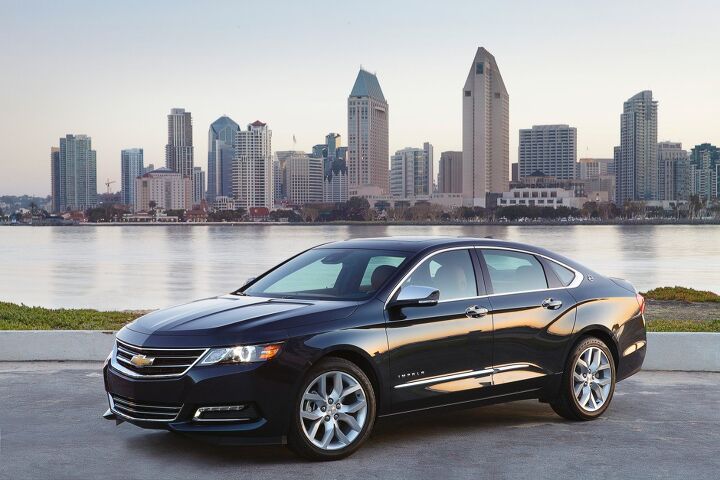Sales of Culled GM Sedans Tell the Story

We’d love to create our own reality, but it’s not achievable. Not while other people exist. I’d prefer a vehicular landscape populated with vinyl-topped sedans and formal personal luxury coupes and regular cab pickups, but alas, the personal buying choices of millions of consumers have stymied those childhood dreams.
With a few rare exceptions, coupes are now the domain of ballsy muscle cars, not front-drive compacts. Sedans were vanishing even before GM’s Monday decision to cull half-a-dozen four-door models. Fiat Chrysler said goodbye to the compact and midsize field a couple of years ago. Meanwhile, Ford has no plans to populate the roadways with anything other than the Mustang and a bevy of light trucks in the near future.
Sad times for lovers of the traditional car, for sure. Still, General Motors’ decision to shutter underperforming plants in pursuit of higher-margin light trucks (and whatever EV or AV action the future holds) shouldn’t come as a surprise. One look at historical sales figures shows the writing was on the wall for General Motors’ crop of soon-to-be-discontinued sedans.
In 2012, just six years ago, some 58 percent of GM sales in the U.S. involved some form of light truck. Over the first three quarters of 2018, that figure was 79.3 percent. That’s a sea change for an automaker already well-stocked with pickups and SUVs.
Through the end of September, Chevrolet Impala sales fell 13.4 percent, year to date. Compared to the model’s high water mark of 2007, however, the Impala’s Q3 figure is 82.4 percent lower than in the same period of that heady year. Chevy Cruze sales fell 25.6 percent, year to date, in 2018, but the loss grows to 56.8 percent if you contrast it with Q3 2014 figures. 2014 was the Cruze’s best sales year.
As for the Volt, 2016 marked the model’s best sales year, but only by a hair compared to 2012. The American election and subsequent fears of a culled EV tax credit sparked a surge of sales that December, inflating the annual tally. Regardless, Volt sales are down 13.4 percent in 2018, and 18.9 percent from 2016.
You don’t have to guess how the Buick LaCrosse fared during this tumultuous decade. It’s well documented. In 2010, the first full year after the LaCrosse nameplate took over full-size duties from the defunct Lucerne (I still see more Lucernes on the road than LaCrosses), Americans lined up for traditional big-car living, then promptly disappeared. LaCrosse sales over the first three quarters of 2018 are 71.8 percent lower than the same period in 2012, and 14.2 percent lower than the same period last year.
Cadillac’s XTS front-drive full-sizer has already seen one production reprieve in its lifetime, and its execution notice was the only one that didn’t take anyone by surprise. Still, the XTS was a relatively consistent seller thanks to its popularity among livery companies. Sales of the Caddy sedan peaked in 2013, with volume falling 46.6 percent between Q3 2013 and Q3 2018.
As for the CT6 flagship sedan, the model never really took off after its release in 2016 — a fate it shared with Lincoln’s reborn Continental. If the first XT4s hadn’t shown up on the sales ledger in Q3 2018, the CT6 would be the lowest volume vehicle in the Cadillac stable, and even then, sales are down 10.6 percent from a year ago.
Americans buyers don’t care that auto journos wouldn’t be caught dead driving a crossover. The thought of a Chevy Equinox in their driveway appeals to them far more than the thought of a Kia Stinger taking up real estate in front of their home. How many Equinoxes did GM sell over the first three quarters of 2018? 234,379. Put another way, that’s roughly 38,000 more sales than the six GM sedans put together.
Whether or not GM can make use of the Oshawa, Lordstown, or Detroit-Hamtramck plants for new, profitable products remains to be seen, but there’s no doubt that the products they did produce had little in the way of a future.
[Images: General Motors]

More by Steph Willems
Latest Car Reviews
Read moreLatest Product Reviews
Read moreRecent Comments
- Varezhka I have still yet to see a Malibu on the road that didn't have a rental sticker. So yeah, GM probably lost money on every one they sold but kept it to boost their CAFE numbers.I'm personally happy that I no longer have to dread being "upgraded" to a Maxima or a Malibu anymore. And thankfully Altima is also on its way out.
- Tassos Under incompetent, affirmative action hire Mary Barra, GM has been shooting itself in the foot on a daily basis.Whether the Malibu cancellation has been one of these shootings is NOT obvious at all.GM should be run as a PROFITABLE BUSINESS and NOT as an outfit that satisfies everybody and his mother in law's pet preferences.IF the Malibu was UNPROFITABLE, it SHOULD be canceled.More generally, if its SEGMENT is Unprofitable, and HALF the makers cancel their midsize sedans, not only will it lead to the SURVIVAL OF THE FITTEST ones, but the survivors will obviously be more profitable if the LOSERS were kept being produced and the SMALL PIE of midsize sedans would yield slim pickings for every participant.SO NO, I APPROVE of the demise of the unprofitable Malibu, and hope Nissan does the same to the Altima, Hyundai with the SOnata, Mazda with the Mazda 6, and as many others as it takes to make the REMAINING players, like the Excellent, sporty Accord and the Bulletproof Reliable, cheap to maintain CAMRY, more profitable and affordable.
- GregLocock Car companies can only really sell cars that people who are new car buyers will pay a profitable price for. As it turns out fewer and fewer new car buyers want sedans. Large sedans can be nice to drive, certainly, but the number of new car buyers (the only ones that matter in this discussion) are prepared to sacrifice steering and handling for more obvious things like passenger and cargo space, or even some attempt at off roading. We know US new car buyers don't really care about handling because they fell for FWD in large cars.
- Slavuta Why is everybody sweating? Like sedans? - go buy one. Better - 2. Let CRV/RAV rust on the dealer lot. I have 3 sedans on the driveway. My neighbor - 2. Neighbors on each of our other side - 8 SUVs.
- Theflyersfan With sedans, especially, I wonder how many of those sales are to rental fleets. With the exception of the Civic and Accord, there are still rows of sedans mixed in with the RAV4s at every airport rental lot. I doubt the breakdown in sales is publicly published, so who knows... GM isn't out of the sedan business - Cadillac exists and I can't believe I'm typing this but they are actually decent - and I think they are making a huge mistake, especially if there's an extended oil price hike (cough...Iran...cough) and people want smaller and hybrids. But if one is only tied to the quarterly shareholder reports and not trends and the big picture, bad decisions like this get made.



































Comments
Join the conversation
We lost a bunch of FWD unibody mostly 4 cylinder cars - woopee I no longer have to worry about getting these in rentals, worse I don't have to put up with a Impala being considered a "Premium" car while the Hemi charger is considered a normal fullsize. Alongside the Camry and Altima that are inexplicably considered full size despite being small midsize cars.
Faithful reader that posts rarely. Does anyone besides me recall article after article in the last 5 years about flexible and lean manufacturing, as well as platform sharing and component commonality. The experts said automakers could be profitable in runs of under 20,000 units. Clearly at GM, even if sales of the Cruze and others are in decline, they sale far more than that. As a corollary to this: anyone see that PSA turned a profit at Opel in Germany after 1 year of ownership. GM could not do that in 23 years. I hate to say it (as an Ohioan with family/friends/neighbors at risk) I think GM's days are numbered.